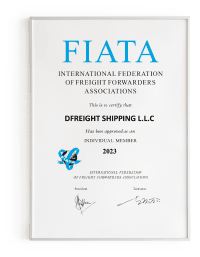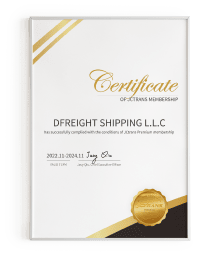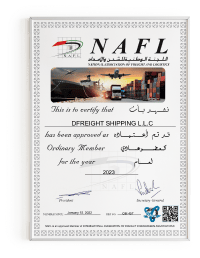Air Freight to Kuwait
Air Freight to Kuwait
Fast, Reliable, and Efficient Air Freight to/from Kuwait
DFreight Air Freight Service is your top choice for swift and dependable air cargo shipping to/from Kuwait. For a variety of commodities, including perishable goods, healthcare supplies, electronics, machinery, or anything that demands fast delivery from Kuwait to the UAE and vice versa, we’ve got you covered. With years of expertise, comprehensive solutions, a commitment to on-time delivery, cutting-edge technology, top-notch security, competitive pricing, and a global reach, we’re here to make your airfreight experience seamless and worry-free. Trust DFreight for excellence in air shipping and submit your inquiry right away to receive the best competitive prices for your air cargo to/from Kuwait.

KuwaitExports and
Imports
The top exports of Kuwait are Crude Petroleum, Refined Petroleum, Petroleum Gas, Planes, Helicopters, and/or Spacecraft, and Cyclic Hydrocarbons, exporting mostly to China, India, South Korea, Japan, and Vietnam.
The top imports of Kuwait are Cars, Packaged Medicaments, Broadcasting Equipment, Planes, Helicopters, and/or Spacecraft, and Copper Wire, importing mostly from China, United Arab Emirate, United States, Saudi Arabia, and Japan.
Market Update
According to OEC, in 2020, Kuwait was the number 61 economy in the world in terms of GDP, the number 51 in total exports, the number 64 in total imports, the number 44 economy in terms of GDP per capita and the number 56 most complex economy according to the Economic Complexity Index.
Kuwait exported US$1.33 Billion during 2021 to the United Arab Emirates and imported US$9.24 Billion during 2021 from the UAE, according to the Trading Economics database.
The Kuwait and UAE freight market is expected to experience strong growth in 2023, driven by strong economic growth, investment in transport and logistics, and the increasing demand for international goods. This growth is expected to be further supported by the development of the Kuwait Free Trade Zone.
Banned Products
There are a number of products that are banned from being imported into Kuwait. These include:
1. Alcohol and alcoholic beverages
2. Narcotics and drugs
3. Weapons and ammunition
4. Pork and pork products
5. Gambling equipment
6. Pornographic material
7. Fireworks and explosives
8. Political and religious materials
9. Counterfeit goods
10. Dangerous chemicals and hazardous materials


Documents & Customs Clearance
One thing to take into account when exporting cargo internationally is customs clearance. You must be aware of the customs clearance regulations of the destination countries when shipping cargo from Kuwait.
The following documentation must be given to local customs for international shipments by the supplier, consignee, or intermediary:
– A commercial invoice
– A packing list
– A bill of lading
– A certificate of origin
Shipping Different Commodities from/to Kuwait
How to Ship Perishable Goods Safe and Sound
How to Ship Fresh Fruits and Vegetables
Seafood Shipping to UAE
Major Air Cargo Port
-
Italy
Germany
United Kingdom
Netherlands
France
Turkey
Spain
Denmark
Switzerland
Czech Republic
Hungary
Poland
Romania
Greece
Portugal
Slovakia
Sweden
Ireland
-
China
India
Taiwan
Hong Kong
Japan
Singapore
South Korea
Malaysia
Qatar
Indonesia
Saudi Arabia
Thailand
Bangladesh
Lebanon
Kuwait
-
Uganda
Congo
Egypt
Rwanda
Kenya
South Africa
Morocco
Algeria
-
-
-


We consolidate cargo from Germany, Belgium, France, Luxembourg, and nearby cities to Amsterdam, then ship it directly to Dubai.
Certificates & Memberships




- Stress-Free Documentation We simplify the paperwork process, making it easy for you to focus on what matters most – your shipment.
- Clear Cost Breakdown Our pricing is straightforward, with a detailed breakdown so you can see exactly where your money goes.
- Dedicated Support We’re just a click away. Your dedicated support team is there to address any questions or concerns promptly.
- Live Shipment Tracking Easily follow your ocean and air freight shipments 24/7 with real-time tracking. No more unexpected delays.
Ship Your Cargo with Ease
Get Started Today!
Why Choose Consolidated Air Freight?
Guaranteed Space
Secure your cargo space without worries.
Reliable Scheduling
Count on our reliable predictive schedules
Nationwide Collections
We pick up your cargo throughout Benelux and Germany
Regional Trucking
Benefit from local trucking within Europe and GCC
Competitive Pricing
Enjoy market-competitive air freight rates
Fast Delivery
Rapid and secure shipping for time-sensitive items
Regional Trucking
Benefit from local trucking within Europe and GCC
Competitive Pricing
Enjoy market-competitive air freight rates
Fast Delivery
Rapid and secure shipping for time-sensitive items
Guaranteed Space
Secure your cargo space without worries.
Reliable Scheduling
Count on our reliable predictive schedules
Nationwide Collections
We pick up your cargo throughout Benelux and Germany
Any Questions?
Reach out to us, and our experts will work with you to discover the tailored solution you need.





 Germany
Germany Netherlands
Netherlands Luxemburg
Luxemburg Belgium
Belgium





